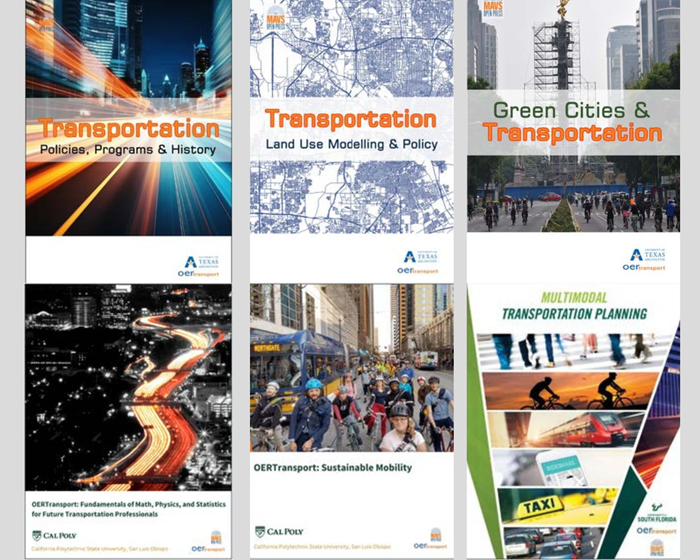Open Educational Resources (OER): Enabling transportation planning professional advancement

A new suite of six openly licensed textbooks is transforming how transportation planning is taught across the U.S., thanks to an ambitious initiative led by CAPPA faculty members at the University of Texas at Arlington (UTA) in partnership with institutions in California and Florida. The Open Educational Resources (OER): Enabling Transportation Planning Professional Advancement project eliminates textbook costs while delivering high-quality, industry-vetted content to students pursuing sustainable and equitable transportation careers.
The OERTransport project, funded by an Open Textbooks Pilot grant from the U.S. Department of Education's Fund for the Improvement of Postsecondary Education (FIPSE), had two missions: eliminate textbook costs in transportation planning courses and expand OER-enabled education in this increasingly critical field. The outcome is six industry-vetted transportation OER textbooks organized into modules that support students' learning.
The worldwide OER movement is rooted in the human right to access high-quality education. This shift in educational practice is not only about cost savings and easy access to openly licensed content, but also about participation and co-creation (source: https://oercommons.org/about). These textbooks reflect that message: removing economic barriers, while enabling students to access timely, relevant, and diverse content that prepares them to address today's transportation challenges.
The textbooks span core topics in transportation planning, including land use modeling, multimodal systems, sustainability, and mathematical and physical foundations needed for transportation engineering. Each was developed in collaboration with faculty, graduate research assistants, an industry advisory group, and piloted in classrooms at UTA, Cal Poly San Luis Obispo, and the University of South Florida. The six titles include:
- Green Cities and Transportation
- Transportation Land Use Modeling & Policy
- Transportation Policies, Programs, and History
- Multimodal Transportation Planning
- Fundamentals of Math, Physics, and Statistics for Future Transportation Professionals
- Sustainable Mobility
According to Green Cities and Transportation author, Dr. Adriana Reyes-Sánchez, the project was inspired by international case studies and the need for inclusive, sustainable transportation systems.
"One example that motivated me was the Bus Rapid Transit system in Curitiba, Brazil, that enabled a sustainable and accessible transit system," she said. "I was inspired by transportation policies and programs implemented across cities in the Global North and the South that have enabled low carbon mobilities while increasing low-income residents' access to transportation systems."
Graduate research assistants (GRAs) also played a key role in reviewing and revising content. Jenifer Reiner, a UPPP Ph.D. student who worked on the project, emphasized the impact of student involvement.
"It was a collaborative process with the professors. We selected readings, illustrations, and real-world examples that would allow us to educate transportation planners on sustainable transportation topics," Reiner explained. "These textbooks are an invaluable resource for students because they are readily available online and cost-effective. The online textbooks are also important tools for training upcoming transportation professionals."
One of the most significant advantages of these zero-cost textbooks is their accessibility and adaptability. Students can access them online from any device, and the content is structured into modules that support personal learning styles. The OER format also allows instructors to update and customize materials as the field evolves.
"Students read OER chapters before in-person lectures, which promotes active discussions and critical analysis in the classroom," said Dr. Reyes-Sánchez. "They also use the books for reflection essays and a reference for literature reviews on transportation topics," reinforcing learning beyond the classroom.
Dr. Ivonne Audirac, project lead, added that OER texts are a game-changer for students from non-engineering backgrounds. At Cal Poly, for instance, one OER-based course replaced three prerequisite classes (math, statistics, and physics), making it easier for planning students to enter the transportation field.
"The students will benefit from having the OER textbooks assembled in one place and distilled the knowledge to be gained in the course and each class session," she said. "They facilitate a pedagogy that helps knock down access barriers of cost and time to courses and knowledge in the field."
Despite challenges like the time-intensive process and pandemic-related delays, the team completed the project with UTA's OER Library and MAVS Open Press support in publishing faculty open textbooks. AI-assisted proofreading, like chatbots, and dedicated student support helped overcome final publishing hurdles significantly.
Dr. Audirac believes this is just the beginning for OER in transportation education. "We've already seen the books adopted as a reference by faculty and students in Colombia, Mexico, and Liberia," she noted. "These texts are designed to transcend borders and support transnational teaching or education."
She added that the future of OER in transportation planning will likely involve integration with AI developments and greater emphasis on skills like data analysis, resilience planning, and equitable implementation of emerging technologies.
For students like Reiner, the project's success proves that open, accessible education can complement academic rigor and global relevance. For the people who made it happen, the OERTransport project is not just about free textbooks but about reimagining education to serve everyone in the transportation field. To have a fuller view of the project, CLICK HERE.